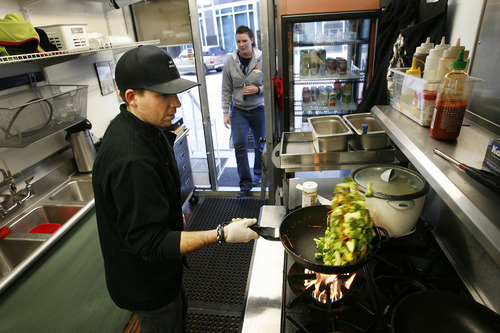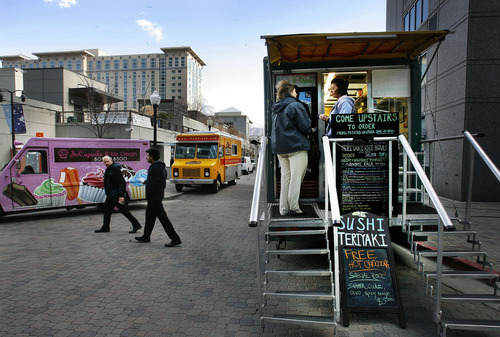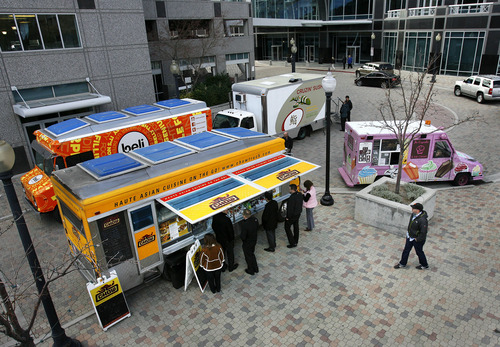This is an archived article that was published on sltrib.com in 2011, and information in the article may be outdated. It is provided only for personal research purposes and may not be reprinted.
Have a hankering for a late-night burger or sushi roll served fresh on a downtown sidewalk? Hoping to grab a healthy, albeit quirky, lunch on the run?
Get your snack on, Salt Lakers, because relaxed rules for long-restricted food trucks appear ready to satisfy City Hall.
The Planning Commission voted Nov. 30 in favor of a new ordinance that would give food trucks 12-hour stints (not the current two hours) to operate. It also would allow vendors to set up their mobile cuisine on city streets and sidewalks, on private property with permission, and in a cluster called a "mobile food court" with a permit.
Oh, and like bigger cities that provide barflies and theatergoers some after-hours grub, Utah's capital finally may loosen the red tape limiting early-morning chow trucks.
"The reality is, the market really wants them here," says Jessica Thesing, the city's small-business liaison. "They provide a different food experience, so people are pretty excited to see them around town."
The City Council is expected to take a final vote on the proposed changes early next year.
The mobile-food craze rolled into Utah late. But since 2010, high-quality vendors such as SuAn Chow's Chow Truck — forced to update her roaming whereabouts via Twitter — have built a customer base and spawned imitators.
On Thursdays at lunchtime, it is not uncommon to see a half-dozen food trucks lining the Gallivan Center plaza — allowed through a Gallivan-initiated permit. The new rules would allow one truck per block on a public right of way, so long as it is at least 100 feet from a restaurant and the vendor pays for parking.
"It's definitely going to help us out," says Josh Hoskins, who along with his wife has rolled Vegas rolls and California rolls inside Cruzin' Sushi for seven months. "The challenge has been to find good spots."
Hoskins, who hopes to sling his sushi at the University of Utah, praises Mayor Ralph Becker's now 1½-year effort to liberalize the rules.
"We want to be sensitive to the brick-and-mortar restaurants," Hoskins says. "But wherever the people are, the crowds, that's where we want to be."
Some restaurants, predictably, have concerns. They argue the trucks would cannibalize their business without being subject to the same regulations nor paying their fair share in property taxes.
"We're all paying full rent to be in a place, and they bring these trucks in that pay minimal fees and they take business away from us," says Robin Paluso, owner of Main Street's Robin's Nest. "None of us are happy about it."
Melva Sine, president of the Utah Restaurant Association, says her group will likely suggest amendments to the measure to help ensure "equality" between restaurants and food trucks.
Under the proposed ordinance, the mobile trucks would need both a business license and a permit from the Salt Lake Valley Health Department.
Thesing says complaints have been sparse, save for a handful of eateries.
"We've had some constructive criticism, which we've taken and tried to implement," she says. "We want to represent everybody, but, obviously, respond to the market."
At least one dissenting vote from the commission came because, Thesing notes, the member thought the proposed ordinance remained too strict.
Historically, food trucks in Salt Lake City were treated like catering trucks (think the so-called "roach coaches" that would serve workers at construction sites).
Clayton Holbrook, who operates the truck Beli, lauds the city's updated approach.
"It would give us the opportunity to go and park on a regular basis so people know where we are rather than making them chase us," he says. "I applaud Salt Lake for not picking winners or losers. That's what America is all about — being able to try. If people like our food, we succeed. If they don't, we fail."
Holbrook bores holes in buns and stuffs sandwich fixings inside his "unsandwich" so they can't fall out. Other trucks — and some trailers — range from Torta Truck and In D' Place Asian Street Food to Surefire Pizza and So Cupcake.
The food trucks differ from the existing sidewalk vendors — which typically serve tacos and hot dogs — including the cart outside Sears on State Street that famously served former Gov. Jon Huntsman.
The amended ordinance would not allow the trucks in parks unless they are part of a special-event permit. That happens regularly at Pioneer Park for the Downtown Farmers Market and the Twilight Concert Series.
Months ago, Chow Truck occasionally set up outside Twilite Lounge a few blocks east of downtown to snatch some midnight business. Twilite bartender Jenial Schultz hopes the loosened rules lures back the food vendors.
"It's a good idea," she says about the proposed law. "We don't serve [much] food, for one. We just have burritos and bags of chips. It will help get us some new business. We have a Crown Burger right next to us, and people are really upset when they close at 10:30."
Thesing says food trucks that get permission from a given bar would be able to set up out front as late as they wanted, as long as they did not exceed 12 hours within a 24-hour period.
"If they do want to take advantage of that late-night bar scene," she says, "they would be able to do that."
Somewhere, pub crawlers are smiling.
Food trucks on a roll
R The Salt Lake City Planning Commission voted Nov. 30 to recommend a new ordinance that would loosen restrictions citywide on mobile-food businesses such as the popular "Chow Truck." The City Council is expected to make the final decision early next year.







